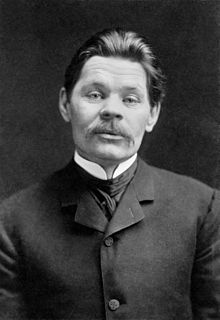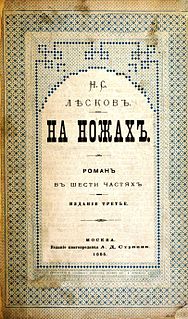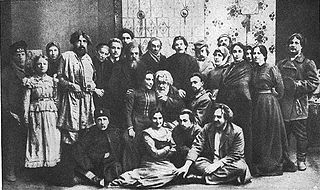Related Research Articles

Alexei Maximovich Peshkov, primarily known as Maxim Gorky, was a Russian and Soviet writer, a founder of the socialist realism literary method, and a political activist. He was also a five-time nominee for the Nobel Prize in Literature. Around fifteen years before success as a writer, he frequently changed jobs and roamed across the Russian Empire; these experiences would later influence his writing. Gorky's most famous works were The Lower Depths (1902), Twenty-six Men and a Girl (1899), The Song of the Stormy Petrel (1901), My Childhood (1913–1914), Mother (1906), Summerfolk (1904) and Children of the Sun (1905). He had an association with fellow Russian writers Leo Tolstoy and Anton Chekhov; Gorky would later mention them in his memoirs.

Nikolai Semyonovich Leskov was a Russian novelist, short-story writer, playwright, and journalist, who also wrote under the pseudonym M. Stebnitsky. Praised for his unique writing style and innovative experiments in form, and held in high esteem by Leo Tolstoy, Anton Chekhov and Maxim Gorky among others, Leskov is credited with creating a comprehensive picture of contemporary Russian society using mostly short literary forms. His major works include Lady Macbeth of Mtsensk (1865), The Cathedral Clergy (1872), The Enchanted Wanderer (1873), and The Tale of Cross-eyed Lefty from Tula and the Steel Flea (1881).
The Village is a short novel by the Nobel Prize-winning Russian author Ivan Bunin, written in 1909 and first published in 1910 by the Saint Petersburg magazine Sovremenny Mir under the title Novelet (Повесть). The Village caused much controversy at the time, though it was highly praised by Maxim Gorky, among others, and is now generally regarded as Bunin's first masterpiece. Composed of brief episodes set in its author's birthplace at the time of the 1905 Revolution, it tells the story of two peasant brothers, one a brute drunk, the other a gentler, more sympathetic character. Bunin's realistic portrayal of the country life jarred with the idealized picture of "unspoiled" peasants which was common for the mainstream Russian literature, and featured the characters deemed 'offensive' by many, which were "so far below the average in terms of intelligence as to be scarcely human."
Dry Valley is a short novel by a Nobel Prize-winning Russian author Ivan Bunin, first published in the April 1912 issue of the Saint Petersburg Vestnik Evropy magazine. Having come out soon after The Village (1910), it is usually linked to the latter as the author's second major book concerning the bleak state of Russia as a whole and its rural community in particular. It is also regarded as the last in Bunin's early 1900s cycle of "gentry elegies". The novel was filmed in 2011, directed by Aleksandra Strelyanaya.
Antonov Apples is a short story by Nobel Prize-winning Russian author Ivan Bunin, written in 1900 and published the same year in the October issue of the Saint Petersburg Zhiznh (Life) magazine, subtitled "Sketches from the Epitaph book".
"Dreams" is a novella by Nobel Prize-winning Russian author Ivan Bunin, written in the late 1903 and first published in the first book of the Znanie (Knowledge) Saint Petersburg literary almanach in 1904, where it was coupled with another short novella, "The Golden Bottom", under the common title "Black Earth" (Чернозём). "Dreams" is generally regarded as the turning point in Bunin's literary career, marking the radical turn towards social issues prior to which he had mostly avoided.

About Chekhov is a book of memoirs by Nobel Prize-winning Russian author Ivan Bunin, devoted to Anton Chekhov, his friend and major influence. Bunin started working on the book in the late 1940s in France. It remained unfinished, and was completed by the writer's widow Vera Muromtseva, and came out posthumously in New York City, in 1955. Translated by Thomas Gaiton Marullo, the book was published in English in 2007, under the title About Chekhov. The Unfinished Symphony.

At Daggers Drawn is an anti-nihilist novel by Nikolai Leskov, first published in 1870 and 1871 by Russky Vestnik. In November 1871 the novel was released in book form. The novel's original text was severely edited by the magazine's staff.

This is a bibliography of the works of Maxim Gorky.
The Pedagogical Poem, translated into English as Road to Life, is a novel by Anton Makarenko, written in 1925-1935 and published in three parts in 1933-1935. Part 1 of the novel came out in 1933, Part 2 in 1935 and part 3 later the same year. As a separate edition, the book came out 1937, through Khudozhestvennaya Literatura.

The Philistines is a debut play by Maxim Gorky written in 1901. It was first published by Znaniye in 1902, subtitled: "The Scenes in the House of Bessemenov. The Drama sketch in 4 Acts".

"Oysters" is a short story by Anton Chekhov published originally in the No. 486, 1884 issue of Budilnik magazine, subtitled "A Sketch" (Набросок) and signed A. Chekhonte. It was included into Chekhov's 1886 collection Motley Stories published in Saint Petersburg, and in a slightly revised version appeared in this book's next 13 editions, in 1892–1899. It was also included into the Russian Writers' Short Stories 1895 collection and later into the Volume 3 of The Collected Works by A.P. Chekhov's first edition.
The Life of a Useless Man is a 1908 Russian-language novel by Maxim Gorky. It concerns the "plague of espionage" under the Empire; the protagonist is Yevsey Klimkov, who spies for the Tsarist regime.
A Confession is a 1908 novel by Maxim Gorky. It first appeared in the Znaniye compilation and almost simultaneously came out as a separate edition via the Ladyzhnikov Publishers in Berlin.
Barbarians is a 1906 play by Maxim Gorky. It was written in the summer of 1905 in Kuokkala and first published by the 1906 Znaniye Collection. It came out as a separate edition via the Ditz Publishers.
The Last Ones is a 1908 four-act drama by Maxim Gorky.
Children is a one-act play by Maxim Gorky, translated as Reception into English. It was first published in the No.9, September 1910, issue of Sovremenny Mir under its original title Vstrecha. Simultaneously it came out as a separate edition under the new title Children, via the Berlin-based Ladyzhnikov Publishers.

"Makar Chudra" is a 1892 short story by Maxim Gorky, first published by the Tiflis newspaper Kavkaz, in the No. 242, 12 September 1892 issue.

"Old Izergil" is a 1895 short story by Maxim Gorky, written in the autumn of 1894 and first published by Samarskaya Gazeta, issues 80, 86 and 89, on 16, 23 and 27 April respectively.

"Chelkash" is a short story by Maxim Gorky, written in August 1894 and first published by Russkoye Bogatstvo in June 1895. The first of the numerous Gorky stories to appear in this magazine, it made the author well known in Russia and was included in all editions of the Complete Works by Maxim Gorky.
References
- 1 2 Commentaries to Чудаки. Collected Works by A.M. Gorky, vol. 12. Khudozhestvennaya Literatura. 1949-1956